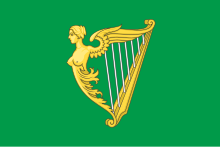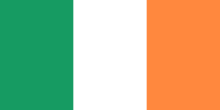Irish Free State at the Commonwealth Games
| Ireland at the Commonwealth Games |
|||||||||
|---|---|---|---|---|---|---|---|---|---|

Representative flag of Ireland
|
|||||||||
| CGF code | IRE | ||||||||
| Medals Ranked 9th |
|
||||||||
| Commonwealth Games appearances (overview) | |||||||||
|
|||||||||
| Other related appearances | |||||||||
|
|
|||||||||
| British Empire Games | |
|---|---|
| Irish Free State at the Commonwealth Games |
|||||||||
|---|---|---|---|---|---|---|---|---|---|

|
|||||||||
| CGF code | IFS | ||||||||
| Medals Ranked 0th |
|
||||||||
| Commonwealth Games appearances (overview) | |||||||||
|
|||||||||
| Other related appearances | |||||||||
|
|
|||||||||
| British Empire Games | |
|---|---|
At the 1930 British Empire Games, the first staging of what is now the Commonwealth Games, a single team represented the entire island of Ireland. Northern Ireland has been represented by its own team since the 1934 games. That year there were also competitors from the Irish Free State. The state had no representation at the 1938 games, and by the time of the next games in 1950 it was ineligible due to the Republic of Ireland Act 1948.
The organising committee for the 1930 games in Hamilton, Ontario sent an invitation to the National Athletic and Cycling Association (NACA), and offered to pay $1000 towards travel expenses. It also invited the Irish Amateur Boxing Association (IABA), which declined in order to concentrate on the 1932 Olympics. The NACA executive decided to accept, on condition that the team be designated "Ireland" rather than "Irish Free State". The NACA was affiliated to the International Amateur Athletics Federation (IAAF) and regarded itself as the governing body for athletics in the whole of Ireland, although a separate Northern Ireland Amateur Athletic, Cycling and Cross Country Association (NIAAA) was affiliated to the Amateur Athletic Association of England (AAA). NIAAA athletes, including some born in the Free State, were included on the AAA's England team.
The NACA's acceptance was controversial among its more militant Irish nationalist supporters antipathetic to British imperialism. The President of the Gaelic Athletic Association publicly dissociated himself from the NACA, and the Crokes club of one of the selected athletes voted to disband in protest.
...
Wikipedia
